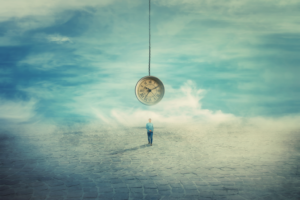Why Does Time Seem to Pass Faster As You Get Older?


Written and verified by the psychologist Sharon Laura Capeluto
Einstein said that time is relative. It doesn’t always flow at the same rate. In fact, an hour can feel like an instant or an eternity.
Among other issues, its speed depends on what we’re doing. As you know, spending an hour enjoying a recital by your favorite artist isn’t the same as spending an hour queuing for a tedious procedure. In the first case, time flies. In the second, it seems not to advance at all. Indeed, although an hour is always 60 minutes, its perception can be really different.
As adults, we tend to notice something rather annoying: the older we get, the faster time seems to pass. There’s a scientific explanation for this.

How does time pass?
In 2005, psychologists Marc Wittmann and Sandra Lenhoff from the Ludwig Maximilian University of Munich (Germany) conducted a study to investigate this phenomenon. They surveyed 499 people between the ages of 14 and 94 to find out how they perceived that time passed. They asked them to give each given period of time a score based on how fast they thought it went by.
The researchers observed that, for short durations, such as a week or a month, the perception of speed didn’t increase significantly for older people. In other words, it didn’t vary with age. However, in relation to longer periods (years or decades), differences were found. In fact, adults tended to feel that it passed faster.
As a matter of fact, most of the participants who were over forty mentioned that, during their childhood, they felt that time passed slowly but, as they got older, they felt as if it increasingly accelerated.
Time passes differently when we’re young
When you were little, every day was an adventure. Indeed, 24 hours is a lot when you’ve barely existed for 8760 hours in total, which is the case for a one-year-old. On the other hand, a ten-year-old boy has lived 87,600 hours and a 50-year-old adult has 438,000 hours under their belt. Therefore, for a one-year-old child, one day represents a considerable percentage of their entire experience but, for an adult, one day can feel like a small thing, as they’ve already lived so many of them.
Think of it like this: By the time you turn four, 50 percent of your life is just two years. On the other hand, when you turn fifty, half of your life corresponds to twenty-five years. People of different ages have a really different notion of time, partly because their lifetimes are different. In fact, the abstract conceptualization of time means that young children don’t fully understand its meaning. It’s not something innate but is acquired at six or seven years.
Experiences
Both the quality and the level of novelty of each lived experience are elements that assume a certain role in determining how fast or slowly time has slipped away.
In this sense, it’s important to make a clarification: human beings have different perspectives in relation to time.
- The prospective perspective is one that we perceive about an event that’s still happening or will happen in the future.
- The retrospective perspective occurs once the event has ended and therefore becomes part of the past.
It’s for this reason that you might feel that time flies on a fun and exciting vacation (prospective perspective), but when you’re home and look back on the trip, you have the feeling that it lasted longer than other of your less amazing experiences (retrospective perspective).
This happens because your brain tends to store new experiences in memory, and not so much the everyday ones. Therefore, you may remember in detail something unexpected that you experienced on an exotic vacation. However, if you’re asked what you had for dinner last Thursday, you might find it difficult to answer.
Neuroscientist, David Eagleman explains that when an experience is repeated frequently, the neurons that are responsible for registering it are activated less. On the other hand, the memory of novel experiences is richer.
As the world around us becomes more familiar, we feel that time is increasingly shrinking.
Novelty helps slow it down
Therefore, our perception of time is based on the number of our new memories. The quintessential stage of new experiences is childhood. During childhood, we have innovative adventures on a daily basis. Everything is pure discovery. The animals, colors, games, activities with friends, meals, and anything else that happens can open up a magical and fascinating world. In fact, everything is a potential wonder.
This means that the more unknown experiences we experience and the more memories we have, we feel that time ‘lasted longer’. However, the life of an adult tends to become rather routine with work, home, and family responsibilities. Consequently, new experiences become increasingly sporadic as we get older.

Fortunately, all isn’t lost
Now that you know why time seems to pass quicker when you get older, you can modify your perception of it by incorporating new activities. Escaping monotony will give you enjoyable surprises. For example, you could sign up for the Arabic cooking course, plan a trip to a culturally different place, change your route to work, or play a particular sport for the first time.
In fact, do anything you haven’t done yet. These experiences will give you new memories that, although they won’t allow you to pause time, will help you to perceive it as passing more slowly.
Einstein said that time is relative. It doesn’t always flow at the same rate. In fact, an hour can feel like an instant or an eternity.
Among other issues, its speed depends on what we’re doing. As you know, spending an hour enjoying a recital by your favorite artist isn’t the same as spending an hour queuing for a tedious procedure. In the first case, time flies. In the second, it seems not to advance at all. Indeed, although an hour is always 60 minutes, its perception can be really different.
As adults, we tend to notice something rather annoying: the older we get, the faster time seems to pass. There’s a scientific explanation for this.

How does time pass?
In 2005, psychologists Marc Wittmann and Sandra Lenhoff from the Ludwig Maximilian University of Munich (Germany) conducted a study to investigate this phenomenon. They surveyed 499 people between the ages of 14 and 94 to find out how they perceived that time passed. They asked them to give each given period of time a score based on how fast they thought it went by.
The researchers observed that, for short durations, such as a week or a month, the perception of speed didn’t increase significantly for older people. In other words, it didn’t vary with age. However, in relation to longer periods (years or decades), differences were found. In fact, adults tended to feel that it passed faster.
As a matter of fact, most of the participants who were over forty mentioned that, during their childhood, they felt that time passed slowly but, as they got older, they felt as if it increasingly accelerated.
Time passes differently when we’re young
When you were little, every day was an adventure. Indeed, 24 hours is a lot when you’ve barely existed for 8760 hours in total, which is the case for a one-year-old. On the other hand, a ten-year-old boy has lived 87,600 hours and a 50-year-old adult has 438,000 hours under their belt. Therefore, for a one-year-old child, one day represents a considerable percentage of their entire experience but, for an adult, one day can feel like a small thing, as they’ve already lived so many of them.
Think of it like this: By the time you turn four, 50 percent of your life is just two years. On the other hand, when you turn fifty, half of your life corresponds to twenty-five years. People of different ages have a really different notion of time, partly because their lifetimes are different. In fact, the abstract conceptualization of time means that young children don’t fully understand its meaning. It’s not something innate but is acquired at six or seven years.
Experiences
Both the quality and the level of novelty of each lived experience are elements that assume a certain role in determining how fast or slowly time has slipped away.
In this sense, it’s important to make a clarification: human beings have different perspectives in relation to time.
- The prospective perspective is one that we perceive about an event that’s still happening or will happen in the future.
- The retrospective perspective occurs once the event has ended and therefore becomes part of the past.
It’s for this reason that you might feel that time flies on a fun and exciting vacation (prospective perspective), but when you’re home and look back on the trip, you have the feeling that it lasted longer than other of your less amazing experiences (retrospective perspective).
This happens because your brain tends to store new experiences in memory, and not so much the everyday ones. Therefore, you may remember in detail something unexpected that you experienced on an exotic vacation. However, if you’re asked what you had for dinner last Thursday, you might find it difficult to answer.
Neuroscientist, David Eagleman explains that when an experience is repeated frequently, the neurons that are responsible for registering it are activated less. On the other hand, the memory of novel experiences is richer.
As the world around us becomes more familiar, we feel that time is increasingly shrinking.
Novelty helps slow it down
Therefore, our perception of time is based on the number of our new memories. The quintessential stage of new experiences is childhood. During childhood, we have innovative adventures on a daily basis. Everything is pure discovery. The animals, colors, games, activities with friends, meals, and anything else that happens can open up a magical and fascinating world. In fact, everything is a potential wonder.
This means that the more unknown experiences we experience and the more memories we have, we feel that time ‘lasted longer’. However, the life of an adult tends to become rather routine with work, home, and family responsibilities. Consequently, new experiences become increasingly sporadic as we get older.

Fortunately, all isn’t lost
Now that you know why time seems to pass quicker when you get older, you can modify your perception of it by incorporating new activities. Escaping monotony will give you enjoyable surprises. For example, you could sign up for the Arabic cooking course, plan a trip to a culturally different place, change your route to work, or play a particular sport for the first time.
In fact, do anything you haven’t done yet. These experiences will give you new memories that, although they won’t allow you to pause time, will help you to perceive it as passing more slowly.
All cited sources were thoroughly reviewed by our team to ensure their quality, reliability, currency, and validity. The bibliography of this article was considered reliable and of academic or scientific accuracy.
- Germano, G. (2017). Temporalidad subjetiva en la juventud y adultez, y su relación con el autocontrol.
- Vargas, E., & Espinoza, R. (2013). Tiempo y edad biológica. Arbor, 189(760), a022-a022.
- Vidal Arenas, J. (2015). La concepción del tiempo en Aristóteles. Byzantion nea hellás, (34), 323-340.
- Wittmann, M., & Lehnhoff, S. (2005). Age effects in perception of time. Psychological reports, 97(3), 921-935.
This text is provided for informational purposes only and does not replace consultation with a professional. If in doubt, consult your specialist.







